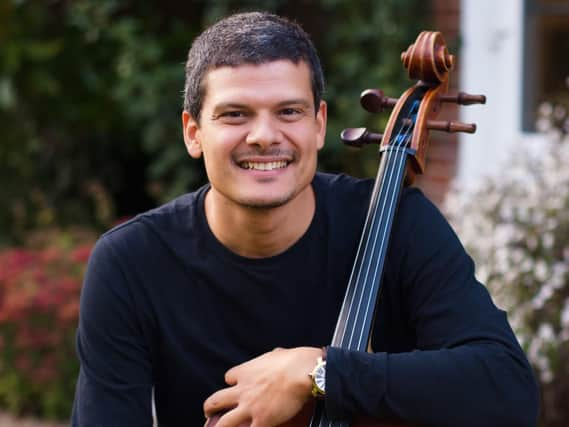Pavlos Carvalho is soloist for Chichester Symphony Orchestra


He will perform Dvorak’s cello concerto with CSO and their new conductor Simon Wilkins. Also in the programme are Mozart’s Magic Flute Overture and Sibelius 5th Symphony.
For Pavlos it’s a step into the unknown to an extent. He doesn’t know the orchestra, he doesn’t know anyone in it, but partly through the Festival of Chichester, he has started to get to know Chichester itself better and better in recent years.
Advertisement
Hide AdAdvertisement
Hide Ad“I am really excited to be playing with them because I have got much closer connected to Chichester now and it is great to be playing with an orchestra that is such an important part of Chichester – and also to be playing my favourite concerto.
“The great thing is that I am playing a piece that is not unknown, that I grew up with and which I have played a number of times.
“If you put aside all intellectualising, I would say that this is the concerto that I love above all others. It is the most epic concerto.
“One of the big challenges is that it is single cello with a symphonic orchestra, and the balance is always tricky because it has a very thick texture.
Advertisement
Hide AdAdvertisement
Hide Ad“It is a very epic texture. It is 40 minutes, and it really is epic. You start in one place and you come out as completely someone else!
“And it is 40 minutes of absolute focus. It is beautiful bohemian folk music combined with classical discipline and structure. You get this classical structure which gives it a really solid architecture, and you have got the folk feel which gives it focus and intensity. They are Dvorak’s own compositions, but it is very much in the bohemian folk style.”
Dvorak was very much in love with his sister-in-law. When she died, he changed the final 60 bars of the piece to reflect what he called the “fading breath” before the end.
“You have got the sheer physicality of the piece, and there is no concerto that makes such technical demands on the cello. You are going up and down it like it is a double bass and a violin at the same time.
Advertisement
Hide AdAdvertisement
Hide Ad“I have done it a number of times over the years. Performing concertos is not really the main thing that I have done. But I would say perhaps I have done it six or seven times. The first time I performed it was 20 years ago, and you see different things in it as you get older.
“I don’t like to sentimentalise music, and it is beautiful whatever you are going through, but when you are suffering loss, these pieces are influenced by whatever emotions you associate with them, and when you think of this one, it makes your hair stand on end.
“It was very different when I was playing it as a very innocent 18-year-old, and now I am 42. You do lose friends and family along the way, and I think you do hear this piece in a different way as you get older.”
Advertisement
Hide AdAdvertisement
Hide Ad